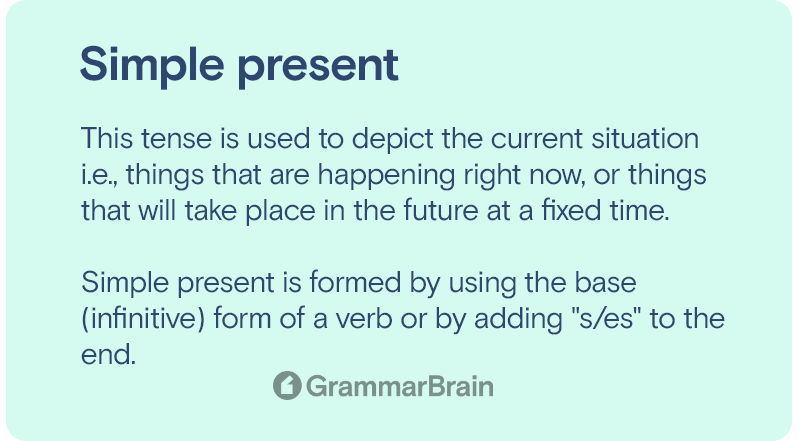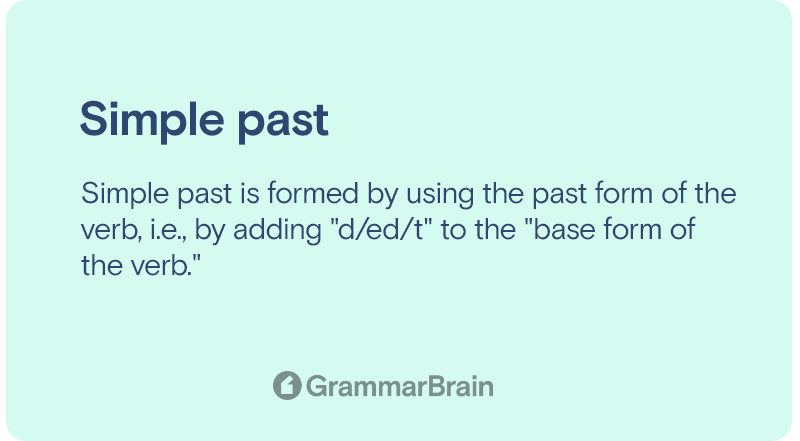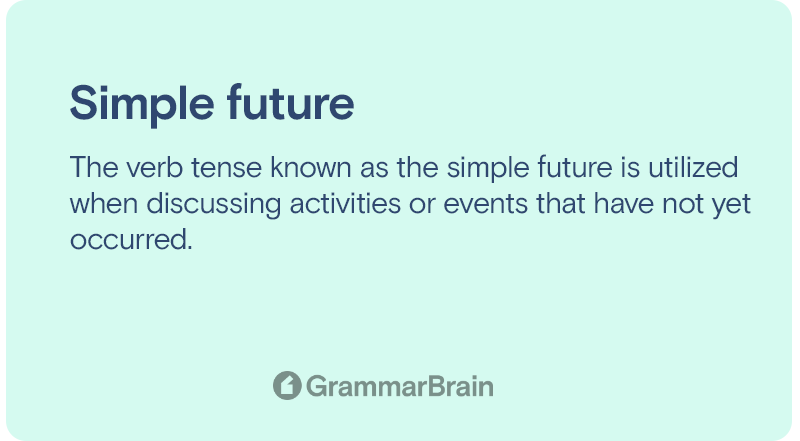What are the various verb tenses? How do the verb tenses change sentences in the English language? These are all great questions. There are many types of verb tense forms in the English language. To learn more about each type, continue reading.
What are tenses?
In the English language, tenses are verb-based devices used to describe the time at which a particular event, action, feeling, or thought occurred or will occur.
Change in tense will change the context of when something happened or is going to happen which will completely alter the meaning of a sentence.
What are the types of tenses?
There are mainly three types of tenses which are as follows:

1. Simple present tense
This tense is used to depict the current situation i.e., things that are happening right now, or things that will take place in the future at a fixed time.
It is also used in factual statements or statements with habitual action. Simple present is formed by using the base (infinitive) form of a verb or by adding “s/es” to the end.
Example: The sun rises in the east.

2. Simple past tense
This tense is used to depict the things that have already happened in the near or distant past (for example an hour ago, yesterday, last week, last month, last year, etc.)
Simple past is formed by using the past form of the verb, i.e., by adding “d/ed/t” to the “base form of the verb.”
Example: I ate breakfast.
3. Simple future tense
This tense is used to depict the things that are yet to happen in the near or distant future. For example, after an hour, day, week, month, or year. The simple future is formed by using “will/shall” + “base form of the verb.”
Example: I will go to the movie.
What are the sub-categories of the three main tenses?
The three main tenses can be further sub-categorized into their progressive or continuous, perfect, and perfect continuous forms:
1. Continuous Tenses
- Present continuous tense: This tense is used when an action or an event is happening currently and may continue some time into the future. Present continuous is formed by adding is/are/am to the present participle form of the verb (i.e., the verb formed by adding “ing” to the end of the base verb). Example: I am doing my homework.
- Past continuous tense: This tense is used when an action has been going on at some time in the past. Past continuous is formed by adding “was/were” to the present participle form of the verb. Example: I was playing with my friend.
- Future continuous tense: This tense is used when an action will be taking place for a period of time in the future. Future continuous is formed by adding “will be/shall be” to the present participle form of the verb. Example: I will be going to my favorite artist’s concert next Wednesday.
2. Perfect Tenses
- Present perfect tense: This tense is used when a past action continues into the present. Present perfect can be formed by adding “has/have” to the past participle form of the verb Example: I have written multiple bogs in this topic before.
- Past perfect tense: This tense is used when an action gets completed before another past action. Example: I had completed my work before the scheduled deadline.
- Future perfect tense: This tense is used when an action will be completed before some point in the future. Example: I will have slept by the time you arrive.
3. Perfect Continuous Tenses
- Present perfect continuous tense: This tense is used when an action has started in the past but is continuing currently in the present. Present perfect continuous is formed by adding has/have and been to the present participle form of the verb. Example: I have been playing football since I was 10 years old.
- Past perfect continuous tense: This tense is used when an action had started in the past and continued till another time in the past. Past perfect continuous is created by adding “had” and “been” to the present participle form of the verb. Example: I had been cooking food when she arrived at the house.
- Future perfect continuous tense: This tense is used to describe an action that will go on till a certain point in the future. Future perfect continuous is formed by adding “will/shall,” “have” and “been” to the present participle form of the verb. Example: In January, I will have been working at the dance studio for three years.
For more examples on past tenses, view the past tense library on this website.
All verb tense forms and their grammar rules
| Tense | Function | Rule | Example |
| Present simple | Helps to describe habits, facts, actions, and truth that are not affected by time | Ist form of verb + s/es | He loves pizza. |
| Past simple | Helps to describe events that have happened in the past | IInd form of the verb | She wore a beautiful dress for the party. |
| Future simple | Helps to describe events that will happen in the future | Will/ shall + Ist form | He will go to New York tomorrow. |
| Present perfect | Helps to describe the relevance of past events in the present moment | Has/ have + IIIrd form of the verb | I have learned to ride a bike. |
| Past perfect | Helps to describe events that happened prior to other events in the past | Had + IIIrd form of the verb | She had finished the paper before leaving the hall. |
| Future perfect | Helps to describe events that will be completed between now and a specific point in the future | Will/ have + IIIrd form of the verb | She will have finished the book by tomorrow. |
| Present continuous | Helps to describe ongoing actions | Is/ am/ are + Ist form + ing | She is reading a book. |
| Past continuous | Helps to describe ongoing events of the past, mostly in relation to another event | Was/ were + Ist form + ing | He was driving to work when the accident happened. |
| Future continuous | Helps to describe future events that will/are expected to continue for a period of time | Will be + Ist form + ing | I will be going to meet my grandparents tomorrow. |
| Present perfect continuous | Helps to describe events that started in the past and will continue into the present | Has/ have been + Ist form + ing | She has been writing a book for the past one year. |
| Past perfect continuous | Helps to describe events that began, continued, and ended in the past | Had been + Ist form + ing | I had been working in this company for ten years when I got the promotion. |
| Future perfect continuous | Helps to describe events that began in the past but will continue until a point in the future | Will/ shall have been + Ist form + ing | I will have been doing business with her for one year. |
FAQs
1. Why are tenses important?
Tenses are important to describe the context of time i.e., when a particular event, action, or thought has occurred.
2. What are the main types of tenses?
There are three main types of tenses: present, past, and future tense.
3. What are the most common English verb tenses?
In terms of use the future tenses are often used in speech. While present perfect tense comes in second. Remember, the three main verb tenses are past, present, and future. Past tenses are found in grammatical writing the most.
4. Why do we have verb tenses in English?
The three main verb tenses all play a part in helping to communicate clearly. The past tenses help us say that something occurred. The future tenses help us describe something about to happen. And the progressive tenses help us combine communication to be descriptive.
All three English verb tenses are commonly used in daily speech and writing.
Sources:
- Merriam-Webster Dictionary – Definition
- MBA Rendezvous – 12 Tenses – Definition, Types, Exercises, Past, Present, Future
- Grammarly – Verb Tenses
- English Club – the 12 basic English tenses
Inside this article
Fact checked:
Content is rigorously reviewed by a team of qualified and experienced fact checkers. Fact checkers review articles for factual accuracy, relevance, and timeliness. Learn more.
Core lessons
Glossary
- Abstract Noun
- Accusative Case
- Anecdote
- Antonym
- Active Sentence
- Adverb
- Adjective
- Allegory
- Alliteration
- Adjective Clause
- Adjective Phrase
- Ampersand
- Anastrophe
- Adverbial Clause
- Appositive Phrase
- Clause
- Compound Adjective
- Complex Sentence
- Compound Words
- Compound Predicate
- Common Noun
- Comparative Adjective
- Comparative and Superlative
- Compound Noun
- Compound Subject
- Compound Sentence
- Copular Verb
- Collective Noun
- Colloquialism
- Conciseness
- Consonance
- Conditional
- Concrete Noun
- Conjunction
- Conjugation
- Conditional Sentence
- Comma Splice
- Correlative Conjunction
- Coordinating Conjunction
- Coordinate Adjective
- Cumulative Adjective
- Dative Case
- Determiner
- Declarative Sentence
- Declarative Statement
- Direct Object Pronoun
- Direct Object
- Diction
- Diphthong
- Dangling Modifier
- Demonstrative Pronoun
- Demonstrative Adjective
- Direct Characterization
- Definite Article
- Doublespeak
- False Dilemma Fallacy
- Future Perfect Progressive
- Future Simple
- Future Perfect Continuous
- Future Perfect
- First Conditional
- Irregular Adjective
- Irregular Verb
- Imperative Sentence
- Indefinite Article
- Intransitive Verb
- Introductory Phrase
- Indefinite Pronoun
- Indirect Characterization
- Interrogative Sentence
- Intensive Pronoun
- Inanimate Object
- Indefinite Tense
- Infinitive Phrase
- Interjection
- Intensifier
- Infinitive
- Indicative Mood
- Participle
- Parallelism
- Prepositional Phrase
- Past Simple Tense
- Past Continuous Tense
- Past Perfect Tense
- Past Progressive Tense
- Present Simple Tense
- Present Perfect Tense
- Personal Pronoun
- Personification
- Persuasive Writing
- Parallel Structure
- Phrasal Verb
- Predicate Adjective
- Predicate Nominative
- Phonetic Language
- Plural Noun
- Punctuation
- Punctuation Marks
- Preposition
- Preposition of Place
- Parts of Speech
- Possessive Adjective
- Possessive Determiner
- Possessive Case
- Possessive Noun
- Proper Adjective
- Proper Noun
- Present Participle
- Prefix
- Predicate




